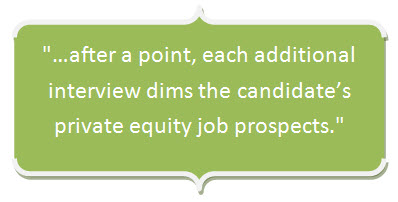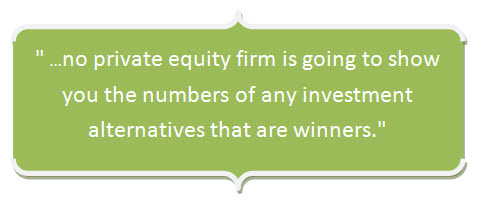Beware the Extended Private Equity Interview Process
If you can’t seal the deal after the third interview, one nine-year industry veteran advises, there might be no deal to seal in your private equity job interview process.
“It’s usually a bearish sign if you don’t get an offer after three rounds of interviews,” said Washington-based attorney Stephen Kaplitt, who formerly practiced M&A law.
Early in his career, he interviewed at a Manhattan law firm and ended up going through an endless battery of meetings. After all that wasted time, it was clear that the partners wanted a securities lawyer, which matched Kaplitt’s experience, rather than an M&A specialist, which matched his aspirations. He has since moved to the other side of the screening desk and is now doing the interviewing for private equity jobs.
He recounts with palpable regret making a young attorney jump through multiple hoops before declining to make an offer. In that case, according to Kaplitt, the issue was neither the candidate nor mismatched needs, but politics and turbulence within the firm.
“Smaller firms tend to be more informal. Bigger firms tend to be more process-oriented,” he said. At the time, he was working for the U.S. federal government – hard to find a bigger firm than that – and “there were five people who, even if they weren’t my boss, influenced my decision.”

Kaplitt’s experience isn’t universal. Your mileage may vary. Still, the four-interview rule seems to be consistent with the anecdotal evidence we heard from others in search of private equity jobs.
“I went through an extensive round of two phoners, then three or four visits to the office over three months,” said a senior associate-level job hunter based in London. At the end of the process, he was denied an opportunity to join a private equity firm in a position that “effectively was my dream job.”
A New York-based private equity job hunter at the associate level said he has had to take off from work for four meetings at an out-of-town firm, in addition to two phone interviews. He said he’s “optimistic,” but does not yet have an offer in hand. How long the private equity job search takes, “depends on how urgently they need someone. I’m not particularly nervous.”
On the Case
The trick to private equity job interviews is to demonstrate a balance of soft skills and hard analytics. Most firms prefer candidates with training and a proven track record at investment banks. Some things don’t change.
Quant ability is important, but it’s also difficult to express in an interview. This may level the playing field for career switchers, providing they can demonstrate they developed a high level of numeracy some other way.
Your chance to do this is through a case study. Typically, the interviewee will be given a homework assignment: Take the financial and operational details of a company that the firm recently considered investing in. Look it over and report back with your opinion. This tests not only your ability to analyze numbers and establish valuation, it also demonstrates your ability to summarize and present findings then effectively persuade an investment committee.

“Three times, I’ve been given a case to prepare,” the London-based senior associate said. “In all three, my recommendation was not to pursue the investment.”
Answering and Asking Tough Interview Questions
One important piece of prep work before getting to the private equity interview is finding out with whom you’re meeting. For a decade now, it has been considered rude not to Google the person who’ll be sitting at the other side of the desk. Over the past few years, LinkedIn has emerged as another valuable online resource.
You need to know your interviewer’s favorite subject. Fortunately, that’s easy. Everybody’s favorite subject is themselves.
“Find out what they’re working on. People love to talk about what they’re doing,” Kaplitt said, then cautioned against hubris. “Never, ever try to project confidence by showing how much you know. Nobody wants an interview candidate telling them how they’re going to solve all the firm’s challenges. The people who stand out are the ones who project confidence, a desire to learn and zero arrogance.”
And be prepared to answer that common old question: “What are your weaknesses?” When he was an interviewee, Kaplitt would deflect it slightly by restating it: “What was your biggest professional mistake and what did you learn from it?”
“I’ve seen two or three transactions that ended up having noteworthy problems,” Kaplitt said. “I learned more from those than from the 99% of deals that went fine.”
“The one that’s hardest to prepare for and the one you’re most likely to hear is, ‘Why do you want to work here?’” the London-based senior associate recalled.
“The story I tell has to be quite specific to that firm.” In his case, the answer usually has to do with specific sectors and geographies of interest to him; he tends not to apply to private equity jobs in firms that aren’t active in those spaces.
Of course, you as the interviewee have no control over what the hiring manager is going to ask. But you do have control over how you respond to the ultimate private equity interview question: “Do you have any questions for me?”
Kaplitt’s advice is simple: Don’t ask personal questions like “Where are you from?” Don’t inquire about things that you can find out or estimate on your own, such as “How many employees do you have?” That shows you did not do your homework.
“Instead, ask about specific deals the interviewer worked on and what were the lessons learned,” Kaplitt said. “And ask what kind of help they could use on their team now.”
“At the more junior level, I will almost always ask what their day is like or what their week is like,” the London-based senior associate said. “It helps define the split between deal sourcing, investment management and actual investing. Also, I’ll ask, ‘If I were to go to work here and it was my first day, what kind of advice would you offer?’”
The New York-based associate echoed that, and also added, “’What are your expectations of me in Year One, Year Two, and so on?’”
And be prepared for ethical questions that probe yow you would cut if you landed the private equity job. These might be hypothetical or they might be based on situations that the firm has found itself in the midst of, but the issues tend to remain constant.
- Should you break the law even if there’s a certainty you won’t get caught?
- Would you give/receive a gift in the deal process?
- When do you put the firm’s interests in front of the client’s?
These come from gray areas, and there may not be a right or wrong answer.
And even if there is some Aristotelian right answer, that might not correlate precisely to the firm’s policies or the interviewer’s own ethical perspective.
The interviewer might be less interested in what your personal ethics are but more interested in whether you have a framework for making such judgments, and if your judgments are likely to cause embarrassment to or litigation against the private equity firm.
Summing Up
Many interviews with the same firm may not be the kiss of death, but it’s also not an indicator of you being a must-have private equity job candidate. The smaller the firm and the more junior the level, time served in interviews is a good thing. But as you move up in the world and on to larger enterprises, be careful not to get lost in the process.
Along the way, make sure that your math skills are equal to those of job candidates coming from the banking sector. And, once you’re positive you can come up with the right answer, make sure you can explain that answer succinctly to a room full of doubters.
Finally, do not be afraid to ask where you measure up in the process. Just like the firm, you are investing time in the private equity job interview process and deserve to know where you stand.
